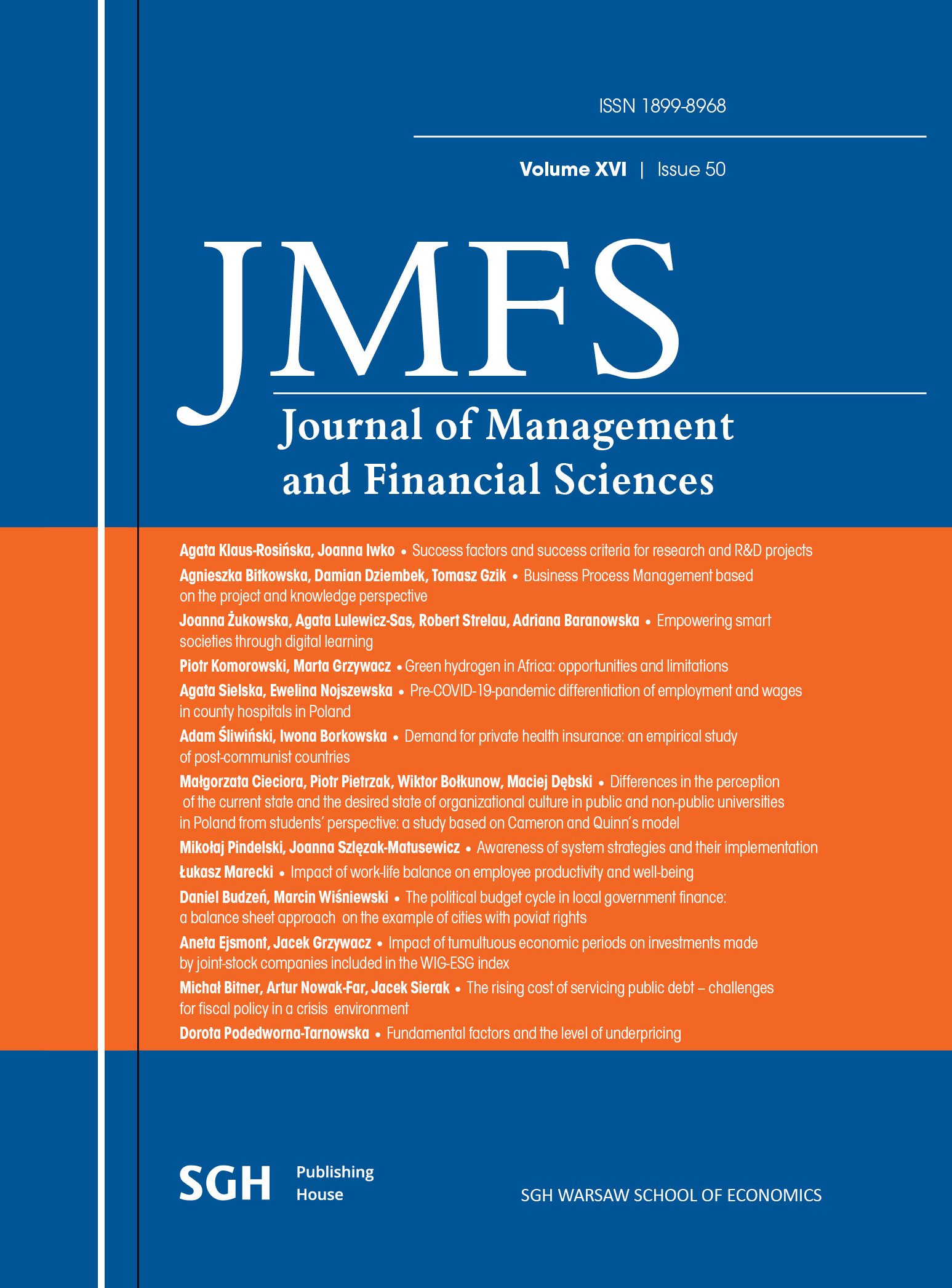Empowering smart societies through digital learning
Main Article Content
Abstrakt
In the era of digitization and globalization, education is undergoing major changes. Learning new competencies is crucial, despite some obstacles such as pandemics. It is possible to perceive the development of digital learning and the evolution of society into a smart society. The article examines the role of digital learning in this process, using a review of scientific literature. Databases such as Proquest, Emerald, Scopus, and Ebsco were searched, using terms related to online education and Society 5.0. An analysis of 27 of the 18,980 entries shows the relationship between the development of education, technology, and society. Technology influences education by promoting self-reliance. However, technology alone is not enough to improve the quality of life, hence the growing need for new forms of learning, leading to Education 5.0. E-learning, focusing on the individual learner, promotes the development of a smart society and the growth of economic activity.
Downloads
Article Details

Utwór dostępny jest na licencji Creative Commons Uznanie autorstwa 4.0 Międzynarodowe.
Bibliografia
Akturk, C., Talan, T., Cerasi, C. C. (2022). Education 4.0 and University 4.0 from Society 5.0 Perspective. 2022 12th International Conference on Advanced Computer Information Technologies (ACIT), pp. 577–582. IEEE, https://doi.org/10.1109/ACIT54803.2022.9913099
Bagaric, D., Franca, V. (2021). What will the future bring? Work, digitalization and social protection under Society 5.0. I ňsan I ňsan, 8, pp. 45–55, https://doi.org/10.29224/insanveinsan. 977145
Carayannis, E. G., Morawska-Jancelewicz, J. (2022). The futures of Europe: Society 5.0 and industry 5.0 as driving forces of future universities. Journal of the Knowledge Economy, 13 (4), pp. 3445–3471, https://doi.org/10.1007/s13132-021-00854-2
Dudko, S. A. (2016). The role of information technologies in lifelong learning development. Les Ulis: EDP Sciences, 10.1051/shsconf/20162901019
Ferreira, C. M., Serpa, S. (2018). Society 5.0 and Social Development: Contributions to a Discussion. Management and Organizational Studies, 5 (4), pp. 26–31, https://doi.org/10.5430/mos.v5n4p26Harayama, Y. (2017). Society 5.0: Aiming for a new human-centered society. Hitachi Review, 66 (6), pp. 554–559.
Hoel, T., Mason, J. (2018). Standards for smart education – towards a development framework. Smart Learning Environments, 5 (1), pp. 1–25, https://doi.org/10.1186/s40561-018-0052-3
Hu, J. (2023). Research on the innovative development of smart community elderly education. The Educational Review, USA, 7 (1), pp. 45–49, 10.26855/er.2023.01.011
Idrisova, J., Alikhadzhiev, S., Moiseenko, N. (2021). Advanced information technologies in education. Les Ulis: EDP Sciences, https://doi.org/10.1051/shsconf/202110603013
Jucevicius, R., Liugailaite-Radzvickiene, L. (2013). Smart development: A conceptual framework. Kidmore End: Academic Conferences International Limited.
Kabakuş, A. K., Özköse, H., Ayaz, A. (2023). Society 5.0 research: performance analysis and science mapping. Gümüşhane Üniversitesi Sosyal Bilimler Dergisi, 14 (1), pp. 311–328.
Keane, D. T. (2012). Leading with Technology. The Australian Educational Leader, 34 (2), 44.
Keksela, O. S., Skvortsova, V. N., Sukhushina, E. V., Rudneva, E. L., Spichenko, T. A. (2016). E-learning as a modern resource of education. Les Ulis: EDP Sciences, 10.1051/shsconf/20162801053
Keidanren (Japan Business Federation) (2016). Toward realization of the new economy and society. Reform of the economy and society by the deepening of “Society 5.0”.
Lam, S., Chung, W. (2010). ICT and lifelong learning: Hong kong’s experience for elderly learners. International Journal of Emerging Technologies in Learning (Online), 5 (2), pp. 61–67.
Lin, M.‑H., Chen, H.‑C., Liu, K.‑S. (2017). A Study of the Effects of Digital Learning on Learning Motivation and Learning Outcome. Eurasia Journal of Mathematics, Science and Technology Education, 13 (7), pp. 3553–3564, https://doi.org/10.12973/eurasia.2017.00744a
Raffaghelli, J. E. (2020). Is Data Literacy a Catalyst of Social Justice? A Response from Nine Data Literacy Initiatives in Higher Education. Education Sciences, 10 (9), 233, https://doi.org/10.3390/educsci10090233
Rambousek, V., Beneš, P., Adamec, M. (2007). Education reality in conditions of developing information society. Problems of Education in the 21st Century, 2, pp. 67–72.
Roblek, V., Meško, M., Podbregar, I. (2021). Mapping of the emergence of society 5.0: A bibliometric analysis. Organizacija, 54 (4), pp. 293–305, 10.2478/orga-2021–0020
Sá, M. J., Santos, A. I., Serpa, S., Ferreira, C. M. (2021). Digitainability – Digital Competences Post-COVID-19 for a Sustainable Society. Sustainability, 13 (9564), pp. 1–22, https://doi.org/10.3390/su13179564
Sá, M. J., Serpa, S., Ferreira, C. M. (2022). Citizen Science in the Promotion of Sustainability:The Importance of Smart Education for Smart Societies. Sustainability, 14 (9356), pp. 1–22, https://doi.org/10.3390/su14159356
Shoikova, E., Nikolov, R., Kovatcheva, E. (2017). Conceptualising of Smart Education. Scientific Journal “Electrotechnica & Electronica”, 3–4, pp. 29–37.
Silvestru, C. I., Lupescu, M. (2015). Using social media in lifelong learning. Academy of Economic Studies. Economy Informatics, 15 (1), pp. 61–68.
Singh, A., Harman, P. S., Alam, F., Agrawal, V. (2022). Role of education, training, and E-learning in sustainable employment generation and social empowerment in saudi arabia. Sustainability,
(14), p. 8822, https://doi.org/10.3390/su14148822
Tănase, F.‑D., Demyen, S., Manciu, V.‑C., Tănase A.‑C. (2022). Online education in the COVID-19 Pandemic – Premise for economic competitiveness growth? Sustainability, 14 (6), p. 3503, https://doi.org/10.3390/su14063503
Tavares, M. C., Azevedo, G., Marques, R. P. (2022). The challenges and opportunities of era 5.0 for a more humanistic and sustainable Society – A literature review. Societies, 12 (6), 149, pp. 1–21, https://doi.org/10.3390/soc12060149
Teichert, L., Salman, M. (2021). Digital technology in the early years: a reflection of the literature. McGill Journall of Education, 56, 2/3, pp. 292–313.
Tikhomirov, V. (2013, Oct). The Moscow State University of Economics, Statistics and Informatics (MESI) on the Way to Smart Education. Kidmore End: Academic Conferences International Limited, pp. 434–439.
Tinmaz, H., Lee, Y-T., Fanea‑Ivanovici, M., Baber, H. (2022). A systematic review on digital literacy. Smart Learning Environments, 9 (21), pp. 1–18, https://doi.org/10.1186/s40561-022-00204‑y
Trubina, I. I., Braines, A. A. (2016). The impact of e-learning in the education in the information society. SHS Web of Conferences, 29 (2016), pp. 1–5, https://doi.org/10.1051/shsconf/20162901072
Ydyrysbayev, D., Kakimova, L. Sh., Boken, G. S., Talgatbekovich, S. Y., Urmatova, A., Orazbaev, E. (2022). Determining the digital transformation in education in the society 5.0 process. International Journal of Emerging Technologies in Learning (Online), 17 (18), pp. 136–145, https://doi.org/10.3991/ijet.v17i18.32331
Yoshida, M., Thammetar, T. (2021). Education between GovTech and Civic Tech. International Journal of Emerging Technologies in Learning (Online), 16 (4), pp. 52–68.
